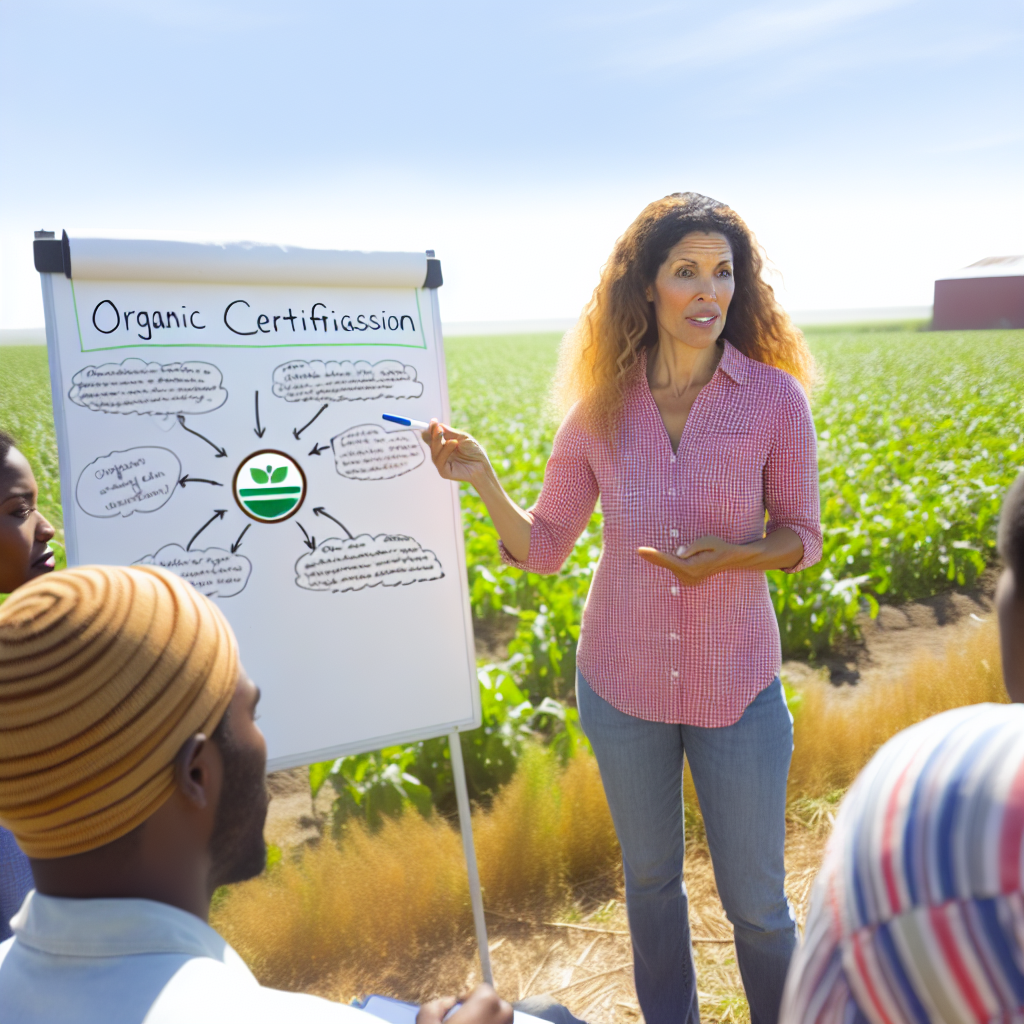Introduction to Organic Certification
Definition of Organic Certification
Organic certification verifies that agricultural products meet specific organic standards.
These standards promote sustainable farming practices.
They also ensure the absence of synthetic pesticides and fertilizers.
Farmers undergo a thorough evaluation process to obtain this certification.
Importance of Organic Certification
Organic certification plays a vital role in today’s agricultural market.
Firstly, it builds consumer trust in food products.
Secondly, it encourages producers to adopt environmentally friendly practices.
Moreover, certified organic products often command higher prices.
This advantage benefits both farmers and consumers.
Facilitating Market Access
Additionally, organic certification opens doors to various markets.
For instance, many restaurants and grocery stores prioritize organic products.
These establishments may only purchase from certified organic suppliers.
Consequently, certified farmers gain access to lucrative sales opportunities.
Enhancing Environmental Sustainability
Organic certification promotes methodologies that protect the environment.
Farmers implement crop rotation and cover cropping techniques.
Transform Your Agribusiness
Unlock your farm's potential with expert advice tailored to your needs. Get actionable steps that drive real results.
Get StartedThese strategies reduce soil erosion and improve soil fertility.
Furthermore, they enhance biodiversity on farms.
Overview of Different Organic Certification Bodies and Standards
Understanding Organic Certification
Organic certification ensures that agricultural products meet specific standards.
This process involves verification of farming practices and production methods.
Certification bodies evaluate and certify farms and processing facilities.
Key Certification Bodies
Several notable organizations oversee organic certification worldwide.
In the United States, the USDA operates the National Organic Program (NOP).
It provides guidelines and standards for organic agriculture.
Similarly, the European Union has its own Organic Certification system.
USDA National Organic Program
The NOP regulates organic production in the United States.
It enforces requirements for labeling organic products.
Farmers must follow strict guidelines to earn the organic label.
European Union Organic Certification
The EU sets rigorous standards for organic products within its member countries.
These standards ensure environmental sustainability and animal welfare.
Each EU country may have its own certification bodies.
International Standard-Setting Organizations
In addition to regional bodies, global organizations play a role.
The International Federation of Organic Agriculture Movements (IFOAM) promotes organic standards.
It fosters dialogue among various certification bodies around the world.
IFOAM Accreditation
IFOAM provides a global framework for organic certification bodies.
Organizations that meet IFOAM standards receive accreditation.
This enhances the credibility and recognition of certified organic products.
Understanding Standards and Practices
Different standards dictate how farms operate and what practices they use.
Organic farming must avoid synthetic pesticides and fertilizers.
Additionally, genetically modified organisms (GMOs) are prohibited.
Showcase Your Farming Business
Publish your professional farming services profile on our blog for a one-time fee of $200 and reach a dedicated audience of farmers and agribusiness owners.
Publish Your ProfilePermitted Practices in Organic Farming
Organic farming relies on natural processes for pest control.
Crop rotation and cover cropping enrich soil health.
These practices ensure long-term sustainability and productivity.
Compliance and Inspection Procedures
Certification bodies conduct inspections to ensure compliance.
Farmers must maintain records of their practices and inputs.
Regular inspections help sustain consumer trust in organic products.
Inspection Frequency
Most certified operations undergo annual inspections.
These inspections review documentation and on-site practices.
Failure to comply can result in penalties or loss of certification.
Transitioning to Organic Certification
Farmers interested in organic certification must undergo a transition period.
This period typically lasts three years for crops.
During this time, they must follow organic practices but cannot sell as organic.
Challenges During Transition
Farmers may face challenges during the transition to organic practices.
These include initial costs and learning new methods.
However, the long-term benefits often outweigh these challenges.
Step-by-Step Process for Obtaining Organic Certification
Understanding Organic Certification
Organic certification verifies that products meet specific standards.
This process ensures products are free from synthetic additives.
Moreover, it guarantees adherence to sustainable farming practices.
Initial Steps for Certification
Begin by selecting an appropriate certifying agent.
This agent must be accredited by a recognized authority.
Next, familiarize yourself with the organic standards required.
Understanding these standards is crucial for a successful application.
Preparation of Required Documents
Gather essential documentation needed for the application.
This often includes farm management plans and records.
Make sure to include input purchase records and production records.
Additionally, provide evidence of sustainable practices in use.
Application Submission
Submit your completed application to the chosen certifying agent.
Ensure all documents are well-organized and complete.
Incomplete applications may delay the certification process.
On-Site Inspection
Prepare for an on-site inspection by the certifying agent.
This inspection assesses adherence to organic standards.
During this phase, the inspector will review your operations.
They may also interview staff and review records on-site.
Review and Decision Process
After inspection, the certifying agent reviews the findings.
They will determine if you meet the organic requirements.
A detailed report is typically provided after this review.
Certification Issuance
If approved, you will receive your organic certification.
This certificate allows you to market your products as organic.
Be aware that annual inspections are required for continuous certification.
Maintaining Organic Standards
Adhere to the practices that led to certification.
Showcase Your Farming Business
Publish your professional farming services profile on our blog for a one-time fee of $200 and reach a dedicated audience of farmers and agribusiness owners.
Publish Your ProfileContinuous compliance ensures your organic status remains valid.
Moreover, keep thorough records to prove ongoing adherence.
Regular training for staff on organic practices is beneficial.
Learn More: How Water Laws Affect Your Farming Practices
Key Eligibility Criteria for Organic Certification Applicants
Organic certification ensures products comply with specific standards.
This certification is crucial for producers seeking organic market access.
Understanding the eligibility criteria helps applicants prepare effectively.
Requirements for Organic Farmers
Farmers must adhere to organic farming practices for at least three years.
They should avoid synthetic pesticides and fertilizers during this period.
This transition period allows the soil to regenerate naturally.
Additionally, farmers must maintain detailed records of farming practices.
Documentation ensures transparency and accountability throughout the process.
Compliance with Organic Standards
Applicants must follow national or regional organic standards.
These standards vary depending on the governing body.
Understanding specific regulations is essential for compliance.
Farmers must also ensure their seeds and planting stock are organic.
Using certified organic materials promotes agricultural sustainability.
Certified Organic Management Practices
Producers need to implement approved organic management practices.
This includes crop rotation, cover cropping, and diversified planting.
Organic practices enhance soil health and reduce disease pressures.
Furthermore, farmers must restrict the use of genetically modified organisms.
GMO restrictions are a fundamental requirement for organic certification.
Inspection and Verification Process
Certification involves a rigorous inspection process by accredited agencies.
Inspectors assess compliance with organic standards on-site.
This includes reviewing records and observing farming practices.
Farmers must address any non-compliance issues identified during inspection.
Successful inspections lead to the awarding of organic certification.
Find Out More: Fair Wages and Benefits in Farming
Documentation Requirements for the Organic Certification Process
Understanding Organic Certification
Organic certification requires comprehensive documentation at every stage.
This documentation proves compliance with organic standards.
Additionally, it facilitates transparency in agricultural practices.
Required Records
Producers must maintain specific records for certification.
These records include input invoices and field maps.
Farmers should also document production methods and crop rotations.
Furthermore, they need to record harvest and sales data.
Input Documentation
Farmers must document all inputs used in organic production.
This includes fertilizers, pest control products, and seeds.
Each input must be verified as compliant with organic standards.
Invoices and receipts serve as vital evidence for this documentation.
Field Maps and Crop Rotation Plans
Field maps illustrate the layout of the farm and specific crops grown.
Showcase Your Farming Business
Publish your professional farming services profile on our blog for a one-time fee of $200 and reach a dedicated audience of farmers and agribusiness owners.
Publish Your ProfileProducers must show their crop rotation plans for the past three years.
This practice ensures soil health and reduces pest pressure.
Record-Keeping Practices
Consistent record-keeping is crucial for successful certification.
Farmers should establish a systematic approach to document management.
Organizing records in a central location simplifies the process.
Regular audits can help maintain documentation integrity.
Sales and Distribution Documentation
Sales records must also be maintained for certified organic products.
Commercial invoices should detail product quantities and buyers.
This documentation supports traceability in the supply chain.
Certification Application Process
After gathering all required documents, farmers may begin their application.
They submit their documentation to an accredited certifying agent.
This initiates a review process that assesses compliance.
Once approved, producers receive their organic certification.
Explore Further: Strategies for Reducing Farm Tax Liabilities
Understanding the Inspection Process
Preparation for the Inspection
Before the inspection, you should gather all necessary documents.
This may include your organic system plan and production records.
Ensure that your farm or facility is clean and organized.
This creates a welcoming environment for the inspector.
Additionally, review the requirements of organic certification.
Familiarizing yourself with these standards will help you succeed.
The Role of the Inspector
An inspector visits your operation to evaluate compliance.
They will check your records and practices against organic standards.
During the inspection, they ask questions to understand your processes.
This communication is vital for a thorough assessment.
Inspectors also look for signs of prohibited substances.
They will examine your soil, crops, and equipment as needed.
Post-Inspection Process
After the inspection, the inspector submits a report to the certifying body.
This report includes findings and any potential non-compliance issues.
You will have the opportunity to address these findings.
If necessary, you may need to make changes to your practices.
The certifying body will then review the inspector’s report.
This review process takes time, so be patient.
Receiving Your Certification
Once approved, you will receive your organic certification.
This certificate allows you to market your products as organic.
Keep in mind that certification must be renewed annually.
Regular inspections ensure continued compliance with organic standards.
Maintaining your practices is crucial for ongoing certification.
See Related Content: GMO Regulation Guide for Small-Scale Farmers

Post-Certification: Maintaining Compliance and Renewals
Understanding the Importance of Compliance
Compliance ensures that your organic certification remains valid.
It reflects your commitment to organic principles.
Showcase Your Farming Business
Publish your professional farming services profile on our blog for a one-time fee of $200 and reach a dedicated audience of farmers and agribusiness owners.
Publish Your ProfileMaintaining compliance involves rigorous record-keeping.
Regularly review your practices to uphold organic standards.
Steps to Maintain Compliance
First, conduct internal audits regularly.
This helps identify any areas needing improvement.
Document all practices thoroughly.
Keep records of inputs, production methods, and sales.
Engage employees in training regarding organic standards.
Annual Renewals: What You Need to Know
Annual renewal is a crucial part of maintaining certification.
Start the renewal process well in advance.
Gather all necessary documentation and records.
Submit your renewal application on time.
Pay attention to any changes in regulations.
Responding to Compliance Failures
In the event of non-compliance, act quickly.
Address any findings from audits promptly.
Implement corrective actions immediately.
Document all steps taken to remedy the situation.
Communicate with your certifying agent throughout the process.
Seeking Guidance and Support
Connect with local organic associations for support.
Consider consulting with organic certification experts.
Stay informed about changes in organic standards.
Joining workshops can also be beneficial.
Networking with other certified farmers provides valuable insights.
Common Challenges Faced During the Organic Certification Process
Navigating Regulatory Complexities
Understanding the regulatory requirements can be daunting.
Each country has its own organic standards.
Moreover, varying certification bodies may impose different rules.
It is crucial to stay informed about the latest regulations.
Maintaining Detailed Records
Keeping thorough documentation is essential for certification.
Farmers must document inputs, outputs, and processes meticulously.
This practice can be time-consuming and tedious.
Increasing organization can ease this workload significantly.
Overcoming Financial Constraints
The certification process can require significant financial investment.
Farmers may face high fees for certification and inspections.
Additionally, transitioning to organic farming can reduce short-term yields.
Seeking financial assistance and grants can help mitigate these concerns.
Dealing with Pest and Disease Management
Organic practices limit the use of conventional pesticides.
Consequently, farmers must find alternative pest management strategies.
This shift requires research and experimentation.
Collaborating with agricultural experts can provide valuable insights.
Ensuring Adequate Training and Education
Farmers often lack proper knowledge of organic practices.
Training programs can fill this educational gap.
Showcase Your Farming Business
Publish your professional farming services profile on our blog for a one-time fee of $200 and reach a dedicated audience of farmers and agribusiness owners.
Publish Your ProfileParticipating in workshops and seminars is beneficial.
Networking with other organic farmers can offer practical advice.
Adapting to Market Demands
The organic market can be unpredictable and competitive.
Farmers must stay attuned to consumer preferences and trends.
Flexibility in production methods becomes crucial.
Furthermore, effective marketing strategies will enhance sales.
Benefits of Organic Certification for Farmers and Consumers
Increasing Market Access
Organic certification opens new markets for farmers.
Consumers actively seek out organic products today.
Farmers can sell directly at higher prices.
Market demand for organic food continues to rise.
Enhancing Customer Trust
Organic certification builds consumer confidence.
Trust encourages repeat purchases from loyal customers.
Certification verifies the integrity of organic practices.
Consumers perceive certified products as healthier.
Improving Environmental Impact
Organic farming promotes sustainable practices.
It reduces chemical use, benefiting ecosystems.
Adoption of organic methods restores soil health.
Farmers contribute to biodiversity through organic practices.
Supporting Local Economies
Organic certification encourages local food systems.
It fosters community relationships between consumers and producers.
Buying local organic products boosts local economies.
Local organic farms create jobs in the community.
Encouraging Healthier Choices
Organic foods typically contain fewer pesticides.
Consumers often find organic products tastier and fresher.
Organic certification assures safety for families and children.
Health-conscious buyers are increasingly choosing organic options.
Additional Resources
EU and U.S. Organic Markets Face Strong Demand … – USDA ERS
What is the Farm Bill? – National Sustainable Agriculture Coalition




